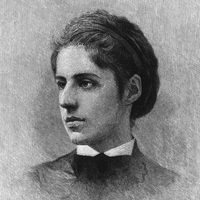The Death of Raschi
[Aaron Ben Mier ‘loquitur.’]
If I remember Raschi? An I live,
Grandson, to bless thy grandchild, I’ll forget
Never that youth and what he did for Prague.
Aye, aye, I know! he slurred a certain verse
In such and such a prayer; omitted quite
To stand erect there where the ritual
Commands us rise and bow towards the East;
Therefore, the ingrates brand him heterodox,
Neglect his memory whose virtue saved
Each knave of us alive. Not I forget,
No more does God, who wrought a miracle
For his dear sake. The Passover was here.
Raschi, just wedded with the fair Rebekah,
Bode but the lapsing of the holy week
For homeward journey with his bride to France.
The sacred meal was spread. All sat at board
Within the house of Rabbi Jochanan:
The kind old priest; his noble, new-found son,
Whose name was wrung in every key of praise,
By every voice in Prague, from Duke to serf
(Save the vindictive bigot, Narzerad);
The beautiful young wife, whose cup of joy
Sparkled at brim; next her the vacant chair
Awaited the Messiah, who, unannounced,
In God’s good time shall take his place with us.
Now when the Rabbi reached the verse where one
Shall rise from table, flinging wide the door,
To give the Prophet entrance, if so be
The glorious hour have sounded, Raschi rose,
Pale, grave, yet glad with great expectancy,
Crossed the hushed room, and, with a joyous smile
To greet the Saviour, opened the door.
A curse!
A cry, ‘Revenged!’ a thrust, a stifled moan,
The sheathing of a poniard-that was all!
In the dark vestibule a fleeing form,
Masked, gowned in black; and in the room of prayer,
Raschi, face downward on the stone-cold floor,
Bleeding his life out. Oh! what a cry was that
(Folk shuddered, hearing, roods off in the street)
Wherewith Rebekah rushed to raise her lord,
Kneeling beside him, striving in vain to quench
With turban, veil, torn shreds of gown, stained hands,
The black blood’s sickening gush. He never spoke,
Never rewarded with one glance of life
The passion in her eyes. He met his end
Even as beneath the sickle the full ear
Bows to its death-so beautiful, silent, ripe.
Well, we poor Jews must gulp our injuries,
Howe’er they choke us. What redress in Prague
For the inhuman murder? A strange Jew
The victim; the suspected criminal
The ducal counselor! Such odds forbade
Revenge or justice. We forbore to seek.
The priest, discrowned o’ the glory of his age,
The widow-bride, mourned as though smitten of God,
Gave forth they would with solemn obsequies
Bury their dead, and crave no help from man.
Now of what chanced betwixt the night of murder
And the appointed burial I can give
Only the sum of gossip-servants’ tales,
Neighbors’ reports, close confidences leaked
From friends and kindred. Night and day, folk said,
Rebekah wept, prayed, fasted by the corpse,
Three mortal days. Upon the third, her eyes,
Sunk in their pits, glimmered with wild, strange fire.
She started from her place beside the dead,
Kissed clay-cold brow, cheeks, lids, and lips once more,
And with a maniac’s wan, heart-breaking smile,
Veiled, hooded, glided through the twilight streets,
A sable shadow. From the willow-grove,
Close by the Moldau’s brink, beyond the bridge,
Her trace was lost. 'T was evening and mild May,
Air full of spring, skies perfect as a pearl;
Yet one who saw her pass amidst the shades
O’ the blue-gray branches swears a sudden flame,
As of miraculous lightning, thrilled through heaven.
One hour thereafter she reentered Prague,
Slid swiftly through the streets, as though borne on
By ankle-wings or floating on soft cloud,
Smiling no more, but with illumined eyes,
Transfigured brow, grave lips, and faltering limbs,
So came into the room where Raschi lay
Stretched 'twixt tall tapers lit at head and foot.
She held in both hands leafy, flowerless plants,
Some she had fastened in her twisted hair,
Stuck others in her girdle, and from all
Issued a racy odor, pungent-sweet,
The living soul of Spring. Death’s chamber seemed
As though clear sunshine and a singing bird
Therein had entered. From the precious herb
She poured into a golden bowl the sap,
Sparkling like wine; then with a soundless prayer,
White as the dead herself, she held the cup
To Raschi’s mouth. A quick, small flame sprang up
From the enchanted balsam, died away,
And lo! the color dawned in cheek and lips,
The life returned, the sealed, blind lids were raised,
And in the glorious eyes love reawoke,
And, looking up, met love.
So runs the tale,
Mocked by the worldly-wise; but I believe,
Knowing the miracles the Lord hath wrought
In every age for Jacob’s seed. Moreover,
I, with the highest and meanest Jew in Prague,
Was at the burial. No man saw the dead.
Sealed was the coffin ere the rites began,
And none could swear it went not empty down
Into the hollow earth. Too shrewd our priest
To publish such a wonder, and expose
That consecrated life to second death.
Scarce were the thirty days of mourning sped,
When we awoke to find his home left bare,
Rebekah and her father fled from Prague.
God grant they had glad meeting otherwhere!

